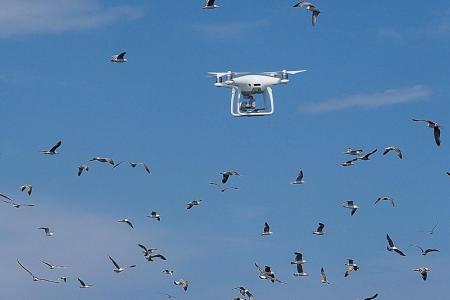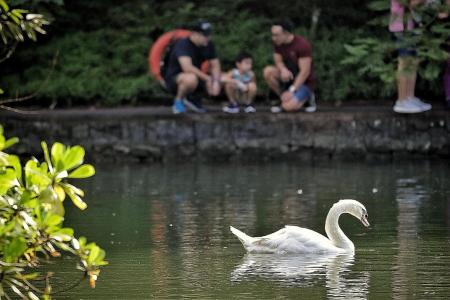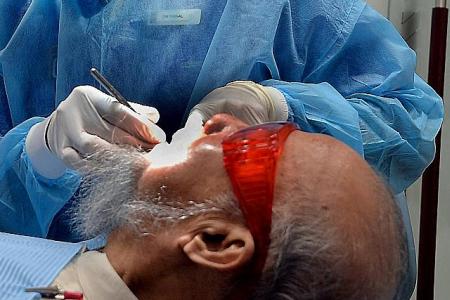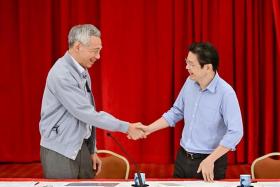Parliament snippets: Drones, adoption and restraint policy
MANAGING DRONES
The Civil Aviation Authority of Singapore (CAAS) plans to develop a centralised flight management system that will provide an island-wide picture of unmanned aircraft activities.
Senior Minister of State for Transport Lam Pin Min said this will allow authorities to zoom in on individual unmanned aircraft systems (UAS), check if they are operating under a valid permit and issue alerts to operators that contravene regulations.
He said the CAAS works with agencies such as the Defence and Home Affairs ministries to destroy rogue drones or force them to land but details of these technologies are classified.
In the past three years, there were eight reports of unauthorised UAS flying within 5km of Changi Airport, which is prohibited. But none made any intrusions into the airport.
ADOPTION BY SAME-SEX COUPLES
After the High Court allowed a same-sex couple to adopt a child conceived through commercial surrogacy last month, a diverse range of reactions and questions about its implications were raised.
Minister for Social and Family Development Desmond Lee told Parliament yesterday that the incident had raised two main issues - the definition of marriage and family and that of commercial surrogacy.
He said that surrogacy is not allowed in Singapore, which discourages planned and deliberate single parenthood as a lifestyle choice.
Mr Lee said his ministry had initially disallowed the adoption after weighing the child's welfare against public policy.
However, it respects the court's decision and is reviewing its adoption laws and practices to see how they should be strengthened to better reflect public policy, he added.
The ministry is also studying the issue of surrogacy carefully.
Mr Christopher De Souza (Holland-Bukit Timah GRC) said: "Commercial surrogacy, in my view, where a woman's womb is rented for money, is demeaning to the child and the woman. It commodifies the life of the baby."
Mr Lee replied that commercial surrogacy is fraught with ethical concerns but added that some have noted that it provides an option for those medically unable to conceive.
He said surrogacy is not allowed in local healthcare institutions because of ethical concerns.
When couples go overseas, every case is scrutinised and looked at by the courts.
RESTRAINT POLICY CHANGE
After a review of its restraint policy, the Ministry of Home Affairs (MHA) will now restrain only persons-in-custody (PIC) between the ages of 16 and 65.
Senior Parliamentary Secretary for Home Affairs Amrin Amin said PICs are restrained at the time of arrest to prevent them from escaping and harming others or themselves.
Whether minors and the elderly are restrained will depend on judgments by officers on the ground, he added.
"If the PIC is suspected of committing serious crimes like murder, rape or drug trafficking, or if the escorting officer assesses, for example, there is a risk of the PIC escaping or causing harm to others or self, then he or she is likely to be restrained," said Mr Amrin.
Any indication of unstable or irrational behaviour can also be reasons for restraints to be used.
This exception policy will not apply to PICs under prisons' custody, such as convicted prisoners and persons in remand.
Replying to Mr Patrick Tay (West Coast GRC), who asked about the restraint policy for PICs with intellectual disabilities, Mr Amrin said they will be treated no differently and restraints will be used if the PIC is aged between 16 and 65.
STERILISATION REVIEW
The Health Ministry (MOH) has asked all healthcare institutions to immediately review their sterilisation processes and ensure staff compliance.
This follows the lapse at Tan Tock Seng Hospital's Dental Clinic, where eight packs of dental instruments were used to treat patients without being fully sterilised.
Reiterating MOH's disappointment, Senior Minister of State for Health Amy Khor said the ministry is conducting its own investigation and will consider if further regulatory actions are needed.
MOH will also review the findings of the National Healthcare Group's investigation and consult experts on whether further actions are needed to reduce the risks of a recurrence in the healthcare sector, Dr Khor said.
A review of local practices will be undertaken to ensure they are up to date.
MOH will also closely monitor the implementation of remedial actions and standards of care at TTSH through audits.
Get The New Paper on your phone with the free TNP app. Download from the Apple App Store or Google Play Store now




